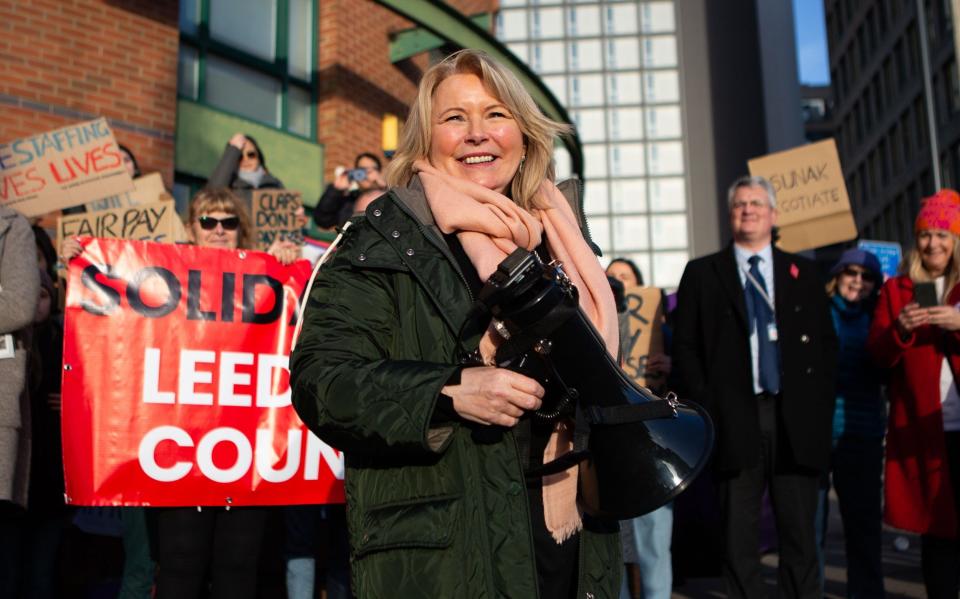Union leaders hail 'chink of optimism' after Rishi Sunak 'shifts' stance on nurses' pay

Nurses’ leaders hailed a “chink of optimism” in averting further national strikes after Rishi Sunak offered to discuss “reasonable” but “affordable” pay deals with the union.
Pat Cullen, the Royal College of Nursing (RCN) general secretary, welcomed a “little shift” in the Prime Minister’s stance after he refused to rule out talks about the current 2022/23 pay deal.
It comes on the eve of meetings on Monday involving representatives from the health, rail and teachers’ unions with their respective secretaries of state.
They are ostensibly focused on the pay deal for the coming year 2023/24 where ministers have indicated there could be significant increases in return for reforms to boost productivity and efficiency.
But the RCN, teaching and rail unions have warned their strikes will continue unless the Government offers concessions on their pay demands this year.
A second national ambulance strike is set to take place on Wednesday and a strike by nurses is scheduled for January 18 and 19.
Around 45,000 junior doctors in England will start voting on Monday on whether to strike over pay with a 72-hour "full walkout" in March. They will not provide emergency care during any action, forcing trusts to arrange emergency cover to ensure patient safety.
Up to 600 workers at the DVLA will also begin a five-day strike on Monday as part of the PCS union’s national campaign after 100,000 civil servants in 124 Government departments voted for action.

Britain’s biggest classroom union, the National Education Union (NEU), will reveal the results of its strike ballot next Monday.
Mr Sunak said ministers were willing to talk about pay that was “reasonable, affordable and responsible for the country.”
The Prime Minister indicated that Monday's talks would not reopen this year’s independent pay review board deals agreed by the Government but would focus on more generous agreements for 2023/24.
However, asked on BBC’s Sunday with Laura Kuenssberg whether talks could include this year’s pay deal, he refused to rule out the possibility. “The most important thing is to be talking…It wouldn’t be right for me to sit here and start having negotiations in public with you or anyone else,” he said.
Ms Cullen said it represented a “chink of optimism.” “There was a little shift in what the Prime Minister was saying,” she added.
Last week she said she was willing to “meet the Government halfway” over pay and would consider a settlement of about 10 per cent if ministers agreed to talks.
“The Prime Minister talked about coming to the table, now that’s a move for me because I have said, let’s meet halfway. I can’t negotiate on my own, and I can’t negotiate on the airwaves,” she said.
“So if that table is now available, I will be there on behalf of the over 300,000 members that participated in this ballot. But it must be about addressing pay for 2022-23.”
Focusing on pay negotiations will not avert strike threat to schools
Mary Bousted, the general secretary of the NEU, said: “If the Prime Minister is holding open the door for much better public sector pay rises for this year, which would both address the cost of living and start to address the long term decline in teachers’ pay, we would be very happy to look at that.”
But she warned that focusing only on the coming year’s pay negotiations would not avert the strike threat to schools this February and March unless it was a “remarkable increase” on a par with the 27 per cent agreed with the Houghton review in the mid 1970s.
The apparent softening in the Government’s stance emerged on Friday in a letter from Steve Barclay, the Health Secretary, to unions, saying the Government was prepared to improve on its pay recommendations for this coming year if unions agree to changes to boost productivity and efficiency.
On the same day, the Rail Delivery Group, which represents train operators, made a new and improved offer to the Aslef train drivers’ union of eight per cent over two years. The offer, which has been signed off by the Department for Transport, would take the average train driver salary from £60,000 to £65,000.

